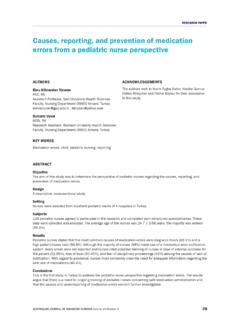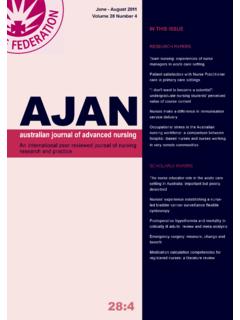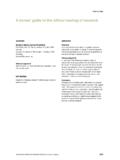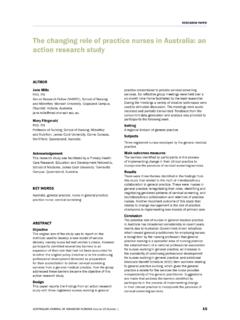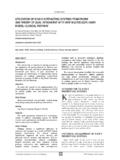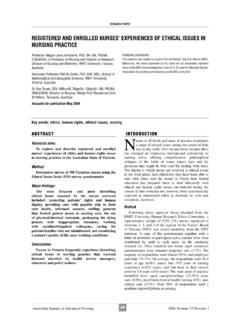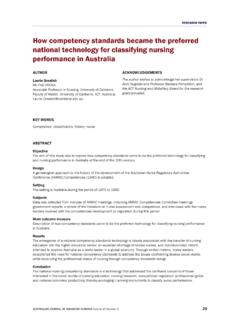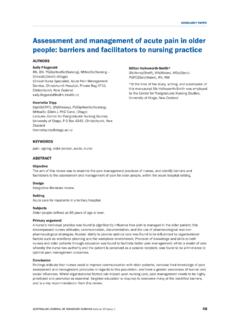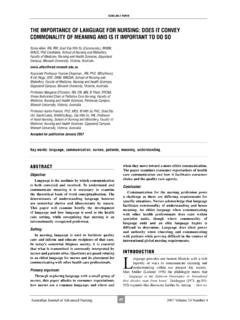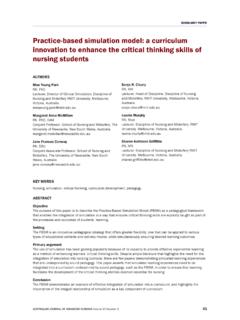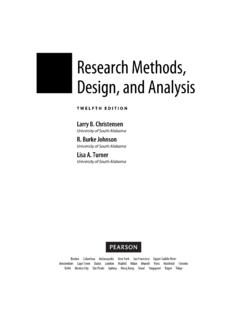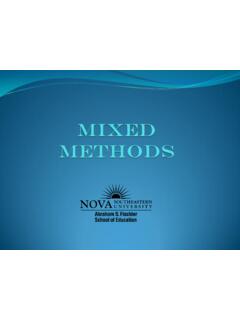Transcription of The benefits of debriefing as formative feedback in nurse …
1 AUSTRALIAN JOURNAL OF ADVANCED NURSING Volume 29 Number 137 SCHOLARLY PAPERThe benefits of debriefing as formative feedback in nurse educationAUTHORSR obyn P CantPhD, MHSc, GradDipHEd research Fellow, School of Nursing and Midwifery, Monash University Churchill, Victoria, 3842 Australia. J CooperPhD, MEd, BA, RGN, FHEA Associate Professor (Acute Care), Monash University, School of Nursing (Berwick), 100 Clyde Rd, Berwick Victoria, 3806 Australia. WORDSD ebrief, formative feedback , formative evaluation, nurse education, teaching and learning methodsABSTRACTO bjective This paper explores the nursing literature to identify the educative process and essential features of debriefing .
2 SettingNursing education settings: undergraduate, postgraduate and professional development in nursing and sourcesStudies of debriefing in nurse education were located in peer reviewed journals between 1990 and May 2010. Searches were made using keywords in six healthcare and one education database. Eleven nursing studies reporting education of individuals and six studies of teams were selected for inclusion; only one study provided learning outcome data. Hence, the literature was synthesised in a narrative form to include related argumentFormative feedback is important in experiential learning and is often applied in nursing in the form of facilitated structured debriefing .
3 debriefing is most commonly reported in relation to clinical skills development and as part of individual and team based simulation training. Educational outcomes are dependant upon the skills of the facilitator in offering feedback in accordance with best practice. Although a key component of higher level education, there is a lack of published evidence with regard to the effectiveness of debriefing techniques in nurse education. A framework for debriefing practice is facilitated debriefing is an important strategy to engage students in learning and is essential in simulation training.
4 Further research is warranted to fully understand the impact of the method in nurse education. AUSTRALIAN JOURNAL OF ADVANCED NURSING Volume 29 Number 138 SCHOLARLY PAPERINTRODUCTIONThe debrief is a common form of retrospective analysis of critical incidents in nursing and the health professions (Ireland et al 2008), but its potential for nurse education has not been fully has been described as a critical incident stress reduction technique that includes structured stages of group discussion (Mitchell 1983). However, studies including a Cochrane review, have failed to agree on the overall value of the technique for traumatic stress reduction although there may be some benefits (Rose et al 2002; van Emmerik et al 2002).
5 Studies also report brief and debrief techniques may enhance skills and improve the quality of patient care (Salas et al 2005). debriefing is therefore an important strategy for teaching and learning in health care. It enhances learning opportunities and enables students to learn from their mistakes (Fanning and Gaba 2007). Didactic approaches to clinical education without debriefing approaches are unlikely to adequately prepare students for clinical practise because of a need to combine core knowledge with clinical skill (Tiwari 2005; Buykx 2011).
6 In recent years there has been a focus on experiential learning strategies that include debriefing techniques for this educative potential (Parker and Myrick 2010; Loyd and Koenig 2008; Agency for Healthcare research and Quality 2000). Such techniques have become known as performance debriefing . There is a paucity of studies on the effectiveness of the method for teaching and TheoryIndividuals differ in their preferred learning style, requiring varied educational approaches with indications that exposure to familiar and unfamiliar teaching techniques will develop learning (Vaughn and Baker 2001).
7 Different modalities and learning preferences have been described in adult education such as visual, visual/verbal, physical (kinaesthetic) and auditory reception (Neuhauser 2002). In addition, both formative and summative assessments enhance learning outcomes; either as a trigger for learning, or from assessment reflection and feedback (Boud and Falchikov 2006). However, assessment tasks should not be limited to surface learning approaches such as the recall of facts, but should include deeper approaches that apply learning in the clinical or clinically simulated context (Tiwari et al 2005).
8 Learning generally takes place through a reception learning process when new meanings are obtained by asking questions and getting clarifications of old concepts and propositions and new concepts and propositions, heavily mediated through language (Novak 2006: p3). This learning process has been described as an experiential learning cycle of four stages by Kolb (1984) (figure 1). First, the learner has a concrete experience, followed by a reflective period to add meaning and perspective. Thirdly, abstract conceptualisations help develop understanding of actions and reactions in the light of previous knowledge.
9 Lastly, the learner applies what has been learned to real situations and experiments with the knowledge. For example, a nurse may learn about the side effects of a prescribed drug through experiencing a patient s collapse; reflecting on the incident and assimilating the learning into work behaviours in the future. The experiential learning cycle can be applied to numerous learning situations in health 1: Kolb s experiential learning cycle3. Abstract conceptualisation 1. Concrete experience 2. Reflective observation 4. Active experimentation AUSTRALIAN JOURNAL OF ADVANCED NURSING Volume 29 Number 139 SCHOLARLY PAPERD ebriefing for reflectionThere is no universally recognised definition of debriefing for learning, broadly considered to be a facilitator or peer led discussion of events.
10 This includes reflection and assimilation of activities into a learner s cognition that aims to produce long lasting learning (Fanning and Gaba 2007). debriefing requires a two way communication process between student and teacher. The process is not just feedback on performance but a communication process that draws out performance explanations and enables students to develop strategies to enhance future performance. Well constructed debriefings lead to positive reflective outcomes (Byykx et al 2011). debriefing is particularly important following formative assessment, as the opportunity to improve performance prior to summative assessment remains.
